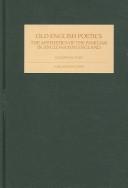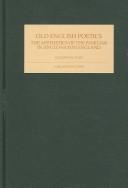| Listing 1 - 6 of 6 |
Sort by
|
Book
ISBN: 9781487514723 1442685956 1442640723 1487514727 9781442685956 9781442640726 1487513380 Year: 2017 Volume: 24 Publisher: Toronto ;Buffalo ;London University of Toronto Press
Abstract | Keywords | Export | Availability | Bookmark
 Loading...
Loading...Choose an application
- Reference Manager
- EndNote
- RefWorks (Direct export to RefWorks)
"In England in Europe, Elizabeth Tyler focuses on two histories: the Encomium Emmae Reginae, written for Emma the wife of AEthelred II and Cnut, and The Life of King Edward, written for Edith the wife of Edward the Confessor. Tyler offers a bold literary and historical analysis of both texts and reveals how the two queens actively engaged in the patronage of history-writing and poetry to exercise their royal authority. Tyler's innovative combination of attention to intertextuality and regard for social networks emphasizes the role of women at the centre of Anglo-Saxon and Anglo-Norman court literature. In doing so, she argues that both Emma and Edith's negotiation of conquests and factionalism created powerful models of queenly patronage that were subsequently adopted by individuals such as Queen Margaret of Scotland, Countess Adela of Blois, Queen Edith/Matilda, and Queen Adeliza. England in Europe sheds new light on the connections between English, French, and Flemish history-writing and poetry and illustrates the key role Anglo-Saxon literary culture played in European literature long after 1066"--
Emma, --- Aelfgifu, --- Edith, --- Encomium Emmae Reginae. --- Vie d'Edouard le Confesseur. --- Vie d'Edouard le Confesseur, by a Nun of Barking Abbey --- Vie d'Edouard --- Life of King Edward the Confessor --- Ici comence le romanz de Saint Edward rei et confessur --- Romanz de Saint Edward rei et confessur --- Al loënge le creatur coment cest' ovre et sa valur --- Al loenge le creatur comence cest ovre et sa valur ... --- Life of Edward the Confessor (Anglo-Norman poem) --- Life of Edward the Confessor, by a Nun of Barking --- Edward the Confessor (Anglo-Norman poem) --- Vie d'Edouard le Confesseur, by a Nun of Barking --- Vie saint Edward, rei et confesseur, par une Deu ancele de Berkinges --- Vie saint Edward, rei et confesseur --- Vie de S. Edward le Confesseur --- Vie de S. Edward le Confesseur, par Une religieuse de Barking --- Edouard (Anglo-Norman poem) --- Encomium Emmae Reginae, Richardi I Ducis Normannorum filiae --- Cnutonis regis gesta --- Kong Knuts handlinger --- Women --- Literary patrons --- Politics and literature --- European literature --- Queens --- Normans --- Literature --- Literature and politics --- Benefactors --- History --- English influences. --- Political aspects --- Femmes --- Mécènes de la littérature --- Politique et littérature --- Littérature européenne --- Reines --- Normands (Français) --- English influences --- Histoire --- Influence anglaise --- Encomium Emmae Reginae --- Vie d'Edouard le Confesseur --- History. --- Queens - Great Britain - Biography --- Women - England - History - Middle Ages, 500-1500 --- Literary patrons - England - History - To 1500 --- Politics and literature - History - To 1500 --- European literature - English influences --- Normans - Great Britain - Biography --- Femmes - Angleterre - Histoire - 500-1500 (Moyen Age) --- Mécènes de la littérature - Angleterre - Histoire - 500-1500 (Moyen Âge) --- Politique et littérature - Histoire - 500-1500 (Moyen Âge) --- Littérature européenne - Influence anglaise --- Reines - Grande-Bretagne - Biographies --- Normands (Français) - Grande-Bretagne - Biographies --- Emma regina --- Eduardus Confessor rex Anglorum --- Editha abb. Wiltoniensis --- Emma, - Queen, consort of Canute I, King of England, - -1052 --- Emma, - reine, épouse de Canut Ier, roi d'Angleterre, - -1052 --- Baldric of Dol --- England --- Goscelin --- Virgil --- Great Britain. --- England.
Digital
ISBN: 9781846154966 Year: 2006 Publisher: Suffolk Boydell & Brewer
Abstract | Keywords | Export | Availability | Bookmark
 Loading...
Loading...Choose an application
- Reference Manager
- EndNote
- RefWorks (Direct export to RefWorks)
Historical linguistics --- Anglo-Saxon language (c. 600-1100) --- English language --- English literature
Book
ISBN: 9781107163362 9781316681299 9781316615157 1316730271 1316732207 1316681297 1107163366 Year: 2019 Publisher: Cambridge Cambridge University Press
Abstract | Keywords | Export | Availability | Bookmark
 Loading...
Loading...Choose an application
- Reference Manager
- EndNote
- RefWorks (Direct export to RefWorks)
History writing in the Middle Ages did not belong to any particular genre, language or class of texts. Its remit was wide, embracing the events of antiquity; the deeds of saints, rulers and abbots; archival practices; and contemporary reportage. This volume addresses the challenges presented by medieval historiography by using the diverse methodologies of medieval studies: legal and literary history, art history, religious studies, codicology, the history of the emotions, gender studies and critical race theory. Spanning one thousand years of historiography in England, Wales, Ireland and Scotland, the essays map historical thinking across literary genres and expose the rich veins of national mythmaking tapped into by medieval writers. Additionally, they attend to the ways in which medieval histories crossed linguistic and geographical borders. Together, they trace multiple temporalities and productive anachronisms that fuelled some of the most innovative medieval writing.
Historiography --- Literature and history --- Middle Ages --- History --- Historiography. --- Great Britain --- History and literature --- History and poetry --- Poetry and history --- Historical criticism --- Authorship --- Medievalists --- Criticism

ISBN: 1903153204 1846154960 Year: 2006 Publisher: [York, England] : York Medieval Press, University of York in association with the Boydell Press,
Abstract | Keywords | Export | Availability | Bookmark
 Loading...
Loading...Choose an application
- Reference Manager
- EndNote
- RefWorks (Direct export to RefWorks)
A new approach to the study of Old English Poetry, featuring close reading of the text, its form and style. Traditions are created and maintained by groups of people living in specific times and places: they do not have a life of their own. In this radical new approach to Old English poetics, the author argues that the apparent timelessness and stability of Old English poetic convention is a striking historical phenomenon that must be accounted for, not assumed, and that the perceived conservatism of Old English poetic conventions is the result of choice. Successive generations of poets deliberately maintained the traditionality of Old English poetry, putting it into dialogue with contemporary conditions to express critique and dissent as well as nostalgia. The author makes particular use of the rich language of treasure to be found in Anglo-Saxon verse to historicise her argument, but her argument has wide implications for how we approach the role of tradition in the poetry of earlier societies. Dr ELIZABETH TYLER teaches in the Department of English and the Centre for Medieval Studies, University of York.
English poetry --- English language --- Old Saxon language --- Low German language --- Germanic languages --- English literature --- History and criticism. --- Aesthetics. --- Style. --- Old English Poetry. --- earlier societies. --- tradition in poetry. --- tradition. --- treasure.

ISBN: 9781846154966 9781903153208 Year: 2006 Publisher: Suffolk Boydell & Brewer
Abstract | Keywords | Export | Availability | Bookmark
 Loading...
Loading...Choose an application
- Reference Manager
- EndNote
- RefWorks (Direct export to RefWorks)
Digital
ISBN: 9781316681299 Year: 2019 Publisher: Cambridge Cambridge University Press
Abstract | Keywords | Export | Availability | Bookmark
 Loading...
Loading...Choose an application
- Reference Manager
- EndNote
- RefWorks (Direct export to RefWorks)
Journalism --- Literature --- History as a science --- History of the United Kingdom and Ireland --- anno 400-499 --- anno 500-1499 --- anno 500-1199 --- Great Britain --- Ireland
| Listing 1 - 6 of 6 |
Sort by
|

 Search
Search Feedback
Feedback About UniCat
About UniCat  Help
Help News
News